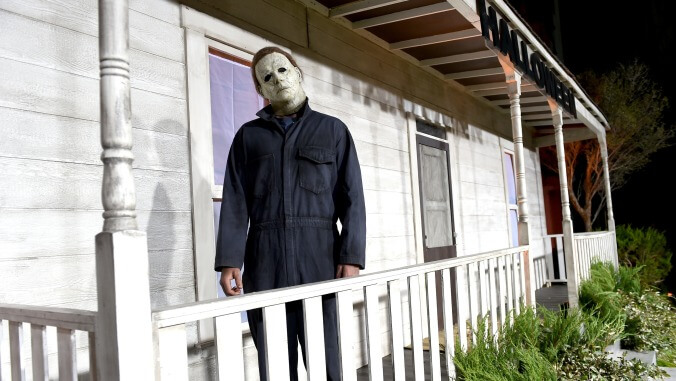Back before the reboot trilogy started, the big selling point for David Gordon Green’s new Halloween series was going to be its back-to-basics approach that expanded on the original John Carpenter movie without wasting time on the complicated mythology of the sequels and without making Michael Myers an immortal monster—all as part of an explicit acknowledgement that the first movie is the best one and none of the sequels have fully captured its magic. But now, ahead of the release of Halloween Ends, Green is making a point to remind people that he can’t just remake the first movie and that sometimes sequels have to try and do new things. So… does that mean we all owe Halloween: Resurrection director Rick Rosenthal an apology?
This comes from GamesRadar’s SFX magazine, which talked to Green about the upcoming sequel and the previous sequel’s ending (which involved the totally not-immortal Michael Myers getting brutally beaten by a mob of Haddonfielders and then getting up to continue killing as if nothing had happened, which was dumb). Green says the “whole point” of Halloween Kills was “unravelling things and not resolving things,” which is certainly a luxury of knowing you’re making the middle movie in a trilogy, and he thinks the “unresolved chaos” is part of the fun of the movie. After all, he has another one coming out this year, and he clearly intends to resolve things there.
But in an apparent nod to the criticism of Kills, Green noted that it’s “so subjective what people want to see with these movies,” since “some people just want to literally watch the original film” but “you have to do something different” instead of just remaking the first movie again. He says he and his other writers on the trilogy (including Danny McBride) have approached certain ideas that fans might think they want to see, but after trying them out, they either haven’t been “enough to sustain [Green’s] interest” or there wasn’t enough to them to “actually go to the emotional and logistical effort of making a movie.” So, instead of doing what people think they want, Green set out to tell the stories he wanted to tell and try to make each of his three Halloween movies “very different” from each other.
So, again, it really reads like someone talking themselves through a realization that every Halloween sequel director has probably had: You can’t just make the original movie again, which means you have to try something different—like, say, Laurie and Michael being related, or Michael getting superpowers from a cult, or Michael inexplicably surviving an attack from an angry mob and still being capable of murdering more people and escaping into the night. We’re not saying this because all Halloween sequels deserve a free pass, we’re saying it so whoever makes the next sequel to Halloween knows what they’re getting into.









































